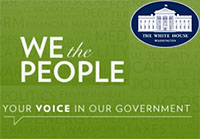Senate rejects the UN disability treaty
Posted on | December 4, 2012 | 5 Comments
Breaking News: Senate Rejects UN Disability Treaty!!! By DICK MORRIS Published on DickMorris.com on December 4, 2012 Printer-Friendly Version One down, three to go. The U.S. Senate this afternoon rejected a proposed UN Treaty on disabilities. All but a handful of Republicans joined in killing the Treaty. Senator James Inhofe (R-OK), the leader of the opposition said the Treaty would create an “unelected bureaucratic body [which] would pass recommendations that would be forced upon the United States if we were a signatory.” Inhofe elaborated: “I do not support the cumbersome regulations and potentially over-zealous international organizations with anti-American biases that infringe on American society.” Bravo! The Senator echoes a key point we have been making in our book Here Come The Black Helicopters: UN Global Governance and the Loss of Freedom.
While the UN Treaty merely encodes in international law, provisions that are already binding on the US in the Americans with Disabilities Act, any subsequent changes our Congress wanted to make would be forbidden since jurisdiction would have been transferred to the UN. And, any further regulations the UN chose to impose would be binding on us without consulting our Congress. Supporters of the Treaty said that it was necessary to protect Americans with disabilities when they travel abroad. This goal is worthy and can best be achieved through bi-lateral treaties with other nations that do not bind the United States hand and foot. All Senate Republicans voted no except for: Ayotte (NH), Brown (Mass), Lugar (Ind), Barrasso (Wyo), Collins (Maine), Murkowsky (Alaska), and McCain (Ariz). This vote is crucial! Coming behind it will be ratification votes on the Law of the Sea Treaty, the Small Arms Treaty, and the Internet Regulation Treaty. We must kill these encroachments on our sovereignty too. The Law of the Sea Treaty transfers legal ownership and sovereignty over the world’s oceans and seas to the UN and obliges signatories to get UN permission for off shore drilling and to share their royalties and technology with third world countries. It also could be used as a backdoor way to enforce limits on carbon emissions. The Small Arms Treaty creates an international body to police exports of small arms from companies and individuals around the world and requires signatory countries to inventory the small arms within its borders and to adopt whatever measures are needed to prevent their export – UN gun control. The Internet Regulation Treaty is currently under negotiation in Dubai and is due to be signed on December 14. It will impose a charge for sending steaming video to anyone outside of your own nation. You will have to pay it and can collect reimbursement from the recipient. It is designed to make it too expensive for Russians and Chinese and others in autocratic countries to access steaming video. We have got to defeat all these treaties. Please sign the petitions below against them. And thank you for your support. It was crucial in enabling us to beat this treaty!
Click Here To Sign The Petition To Stop The Law Of The Sea Treaty!
Click Here To Sign The Petition To Stop The U.S. From Signing The Arms Trade Treaty!
Click Here To Sign The Petition To Stop UN Control Of The Internet!
Click Here to sign up to get all of Dick’s videos emailed to you!
View my most recent videos in case you missed them!
UN-Democratic: UN Admits Palestine! Dick Morris TV: Lunch Alert!
Save The Internet From The UN! Dick Morris TV: Lunch Alert!
How The Christian Right Spawned Feminism And Women’s Suffrage! Dick Morris TV: History Video!
A Six-Point Action Agenda! Dick Morris TV: Lunch Alert!
Don’t Be Sad…We Will Win! Dick Morris TV: Lunch Alert!
Comments
5 Responses to “Senate rejects the UN disability treaty”
Leave a Reply













 29839 Sta Margarita Pkwy,
29839 Sta Margarita Pkwy, 
 Videography by Barbara Rosenfeld
Videography by Barbara Rosenfeld 


December 4th, 2012 @ 3:45 pm
and they’d reject you as well…
December 4th, 2012 @ 3:49 pm
Get us out of the UN, and get the UN out of the US. Maybe they can relocate to Viet Nam.
December 5th, 2012 @ 1:49 am
Can anyone believe this? This Senate actually did something great and constructive! Now this is the way things should be and not any other way! Who cares what the UN wants, anyway? Screw them!
December 5th, 2012 @ 1:52 am
And…let me say this: Everyone get your “2nd wind,” and pace yourselves, cause this could be a seige, when anything starts! Everyone sign these petitions and pass this on to as many Patriots as possible.
December 5th, 2012 @ 12:15 pm
https://www.heritage.org/research/reports/2010/08/us-funding-of-the-united-nations-reaches-all-time-high
U.S. Funding of the United Nations Reaches All-Time High
By Brett D. Schaefer
August 13, 2010
The source and amounts of all U.S. funding to the myriad number of organizations affiliated with the United Nations are difficult to track accurately. This difficulty prompted Congress to pass legislation requiring the Administration to report annually on U.S. contributions to the U.N. A recent report to Congress by the Office of Management and Budget (OMB) on all U.S. funding to the U.N. system revealed that U.S. contributions to the U.N. system reached record levels in fiscal year (FY) 2009.[1]
Considering budget trends, U.S. contributions will continue to rise. Having an accurate account of U.S. contributions to the U.N. is valuable, particularly considering recent revelations about institutional weaknesses in U.N. oversight. Congress should take action to make the current OMB reporting requirement permanent.
U.S. Funding of the U.N. System
The U.S. has been the largest financial supporter of the U.N. since the organization’s founding in 1945. The U.S. is currently assessed 22 percent of the U.N. regular budget and more than 27 percent of the U.N. peacekeeping budget. In dollar terms, the Administration’s budget for FY 2011 requested $516.3 million for the U.N. regular budget and more than $2.182 billion for the peacekeeping budget.[2]
However, the U.S. also provides assessed financial contributions to other U.N. organizations and voluntary contributions to many more U.N. organizations. According to OMB, total U.S. contributions to the U.N. system were more than $6.347 billion in FY 2009.[3] This is more than $1 billion more than total contributions as compiled by OMB for FY 2005,[4] and it is indicative of the rising budgetary trends in the U.N. and the consequential demand on U.S. financial support.
The reporting requirement was instigated by the expansion of the U.N. system. The creation of new U.N.-affiliated bodies over the years that received independent financial support from the U.S. government made it increasingly difficult to calculate how much the U.S. provided to the U.N. system on an annual basis. Past estimates were based on contributions from the State Department to the U.N. system, but this was not comprehensive. Although the State Department is the largest source of U.S. funding to the U.N. system, it is not the sole source.
For instance, the U.S. Department of Agriculture provides funding to the Food and Agriculture Organization, the Department of Energy provides funds to the International Atomic Energy Agency, and the Department of Health and Human Services provides funds to UNICEF. The State Department had no authority to require other departments to report these funding activities; therefore, estimates by the State Department on U.S. funding of the U.N. system generally failed to take them into account.
In an effort to get an authoritative figure for total U.S. contributions to the U.N., Senator Tom Coburn (R–OK) sent a letter in 2006 to former OMB director Rob Portman requesting a comprehensive report on total U.S. contributions to the U.N. system for fiscal years 2001–2005.[5] Because OMB is in charge of overseeing the preparation of the President’s budget, it was in a position to require all parts of the U.S. government to report the requested information.
The results of the first report were eye-opening. The State Department inexactly estimated that the U.S. contributed “well over $3 billion” to the U.N. in 2004.[6] In its 2006 report, OMB calculated that U.S. contributions to the entire U.N. system actually totaled $4.115 billion in 2004 and $5.327 billion in 2005.[7] Thus, the State Department estimate for 2004 was only about 75 percent of the actual U.S. contribution for that year as calculated by OMB.
An Implausible Reduction
Interest in having this data readily available led Congress to adopt legislation calling on the Administration to submit an annual report on all assessed and voluntary contributions to the U.N.[8] The President delegated responsibility for producing the report to the State Department.
The State Department reported U.S. contributions to the U.N. system of $4.546 billion in FY 2006 and $4.158 billion in FY 2007,[9] implausibly indicating that the U.S. had reduced its U.N. contribution for two successive years following the OMB report. The State Department provided no explanation for the lower reported contributions, but analysis of the reports reveals that the lion’s share of the reduction was due to a sharp decrease in contributions to U.N. peacekeeping and the U.N. regular budget.
This is extremely unlikely, because the U.N. regular budget and peacekeeping budget were each expanding rapidly over that period, and U.S. contributions to these two particular budgets are assessed (mandatory) rather than voluntary.[10] Indeed, other budget documents at the State Department indicated that U.S. contributions to peacekeeping and the U.N. regular budget during this period were higher than the amounts stated the State Department report on U.S. contributions to the U.N. in FY 2006 and FY 2007.[11] Unsurprisingly, the most recent State Department report indicated that U.S. contributions jumped nearly 50 percent over FY 2007 to $6.09 billion in FY 2008, led by a nearly $2 billion increase in contributions from the State Department and other international programs.
Distrust in the accuracy of the State Department report led Congress to designate OMB as the Administration agency to compile and submit the report and for it to be made publicly available on the Internet.[12] The OMB released its report on FY 2009 U.S. contributions to the U.N. in June 2010. The report revealed that the U.S. provided $6.347 billion to the U.N. system in FY 2009, including over $4 billion from the State Department, over $1.7 billion from USAID, over $245 million from the Department of Agriculture, and tens of millions more from the Departments of Health and Human Services, Labor, and Energy.
This is an all-time record in U.S. financial contributions to the U.N. system but, considering recent budget trends in the U.N., the record is likely to be broken in FY 2010.
This information comes at a time when trust in the capability and willingness of the U.N. to monitor and oversee its activities to prevent mismanagement, corruption, and waste is at a particularly low ebb. In July 2010, an internal memo by Inga-Britt Ahlenius, a Swedish auditor whose non-renewable five-year term as Undersecretary-General of the Office of Internal Oversight Services (OIOS) had ended, charged U.N. Secretary-General Ban Ki-moon and his associates of undermining efforts to combat corruption in the organization. With U.S. contributions to the U.N. at record levels, the assessment by Ahlenius should alarm Congress, since the OIOS is one of the key oversight bodies in the U.N.
Permanent Reporting Requirement Needed
It is stunning to realize that until a few years ago, the U.S. Congress had only a general idea of how much the U.S. was providing to the United Nations on an annual basis. Congress is right to demand accurate information on exactly how much the U.S. is providing to the U.N. system each year. This is particularly relevant considering the vulnerability of U.S. taxpayer dollars to waste, mismanagement, and corruption in the U.N. system and the lack of transparency and oversight in the U.N. generally.
Making sure U.S. contributions are used appropriately starts with knowing how much the U.S. is providing to the U.N. and where that funding originates. The legislative requirement for the Administration to report to Congress on U.S. contributions to the U.N. is scheduled to expire in 2011. Congress should take action to make this reporting requirement permanent.
Brett D. Schaefer is Jay Kingham Fellow in International Regulatory Affairs in the Margaret Thatcher Center for Freedom, a division of the Kathryn and Shelby Cullom Davis Institute for International Studies, at The Heritage Foundation and editor of ConUNdrum: The Limits of the United Nations and the Search for Alternatives (Rowman & Littlefield Publishers, 2009).
Show references in this report
[1]Peter Orzag, “Annual Report on United States Contributions to the United Nations,” Office of Management and Budget, June 7, 2010, at https://www.whitehouse.gov/sites/default/files/omb/assets/legislative_reports/us_contributions_to_the_un_06112010.pdf (August 13, 2010).
[2]U.S. Secretary of State, “Congressional Budget Justification Volume 1: Department of State Operations Fiscal Year 2011,” pp. 544, 665, at https://www.state.gov/documents/organization/136355.pdf (August 13, 2010).
[3]Orzag, “Annual Report.”
[4]Robert Portman, “Report on US Contributions to the United Nations System,” Office of Management and Budget, July 31, 2006, at https://www.eyeontheun.org/assets/attachments/documents/OMB_report_on_US_contributions_to_UN.pdf (August 13, 2010).
[5] Ibid.
[6]U.S. Department of State, Bureau of International Organization Affairs, “U.S. Participation in the United Nations: Financial Contributions,” September 9, 2005, at https://islamabad.usembassy.gov/pakistan/h05091307.html (August 13, 2010).
[7]Portman, “Report on US Contributions.”
[8]As stated in the 2008 State Department Report, “Section 1225 of the John Warner National Defense Authorization Act for Fiscal Year 2007 (P.L. 109-364) calls for the President to ‘submit to Congress a report listing all assessed and voluntary contributions of the United States Government for the preceding fiscal year to the United Nations and United Nations affiliated agencies and related bodies.’ The President delegated responsibility for this report to the Secretary of State, in coordination with the Secretary of Defense and the Director of National Intelligence, and the heads of other departments and agencies, as appropriate.” U.S. Department of State, “Report to Congress on U.S. Contributions to the United Nations System,” May 15, 2008, at https://www.state.gov/documents/organization/130242.pdf (August 13, 2010).
[9]U.S. Department of State, “Report to Congress on U.S. Contributions to the United Nations System,” May 15, 2008.
[10]For instance, since the 2000–2001 biennial budget, the U.N. regular budget has more than doubled, reflecting the U.N.’s failure to adopt reforms to reduce waste, prevent mismanagement and corruption, and increase efficiency. The U.N. peacekeeping budget increased more than threefold from $1.7 billion in 2000–2001 to $7.8 billion for 2009–2010. See Brett D. Schaefer, “Time to Rein in the U.N.’s Budget,” Heritage Foundation Backgrounder No. 2368, February 3, 2010, at https://www.heritage.org/Research/Reports/2010/02/Time-to-Rein-in-the-UNs-Budget.
[11]Specifically, the State Department report for U.S. contributions to the U.N. system indicates that U.S. contributions to the regular budget were $438.9 million in FY 2006 and $300 million in FY 2007. By contrast, the actual contributions listed in the State Department’s Budget in Brief tables ($438.9 million in FY 2006 and $422.7 million in FY 2007) indicate significantly higher U.S. contributions to the U.N. regular budget for FY 2007. Similarly, the State Department report for U.S. contributions to U.N. peacekeeping is significantly less than the actual contributions reported in the State Department’s Budget in Brief tables. See U.S. Department of State, Bureau of Resource Management, “FY 2008 Budget in Brief: International Organizations,” February 5, 2007, at https://www.state.gov/s/d/rm/rls/bib/2008/html/79740.htm (August 13, 2010); U.S. Department of State, “The Budget in Brief Fiscal Year 2009,” pp. 101–108, at https://www.state.gov/documents/organization/100033.pdf (August 13, 2010); U.S. Department of State, “The Budget in Brief Fiscal Year 2010,” pp. 107–115, at https://www.state.gov/documents/organization/122511.pdf (August 13, 2010).
[12]See Section 1243 of the National Defense Authorization Act for Fiscal Year 2010 (P.L. 111-84).